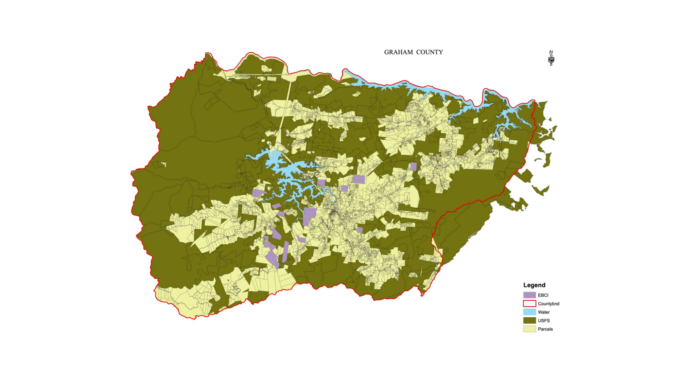For 25 years, funding for what’s called Secure Rural Schools (SRS) has made a difference to schools in counties where a large percentage of the land is owned by the federal government and thus tax exempt.
In North Carolina, 26 counties receive this federal funding, and 19 of those are in the Hurricane Helene federal disaster declaration.
In January 2025, EdNC first reported that the funding had not been reauthorized by Congress.
Legislation was introduced in the previous Congressional session, and the U.S. Senate unanimously passed it in November 2024. However, it did not receive a vote in the U.S. House of Representatives before Congress adjourned at the end of the year.
“The program needs to be reauthorized as soon as possible to avoid a gap in funding for rural counties that rely on the program for much-needed services,” according to this press release.
Graham County, for example, has the most to lose, receiving $180,505.61 in 2024.
“Since its enactment, SRS has provided $7 billion in payments to more than 700 counties and 4,400 school districts across 40 states,” says this press release. “Without reauthorization, these critical payments will expire, leaving many counties struggling to fund schools, road maintenance, and emergency services.”
New bills have been filed in both houses
A bipartisan group of 22 senators has reintroduced legislation, S. 356, to reauthorize the U.S. Forest Service’s Secure Rural Schools and Self-Determination Program through 2026.
“The SRS program is a vital lifeline for rural counties where federal lands generate insufficient revenue for important local services,” said Sen. Mike Crapo, R-Idaho, who sponsored the bill. “I urge both the Senate and House to take up this measure expeditiously, and remain committed to finding a viable long-term solution that provides more certainty to rural county governments in the future.”
“Our bipartisan bill provides reliable funding that is crucial to keeping schools and libraries open, maintaining roads, restoring watersheds, and ensuring there are police officers and firefighters to keep rural communities safe,” said Sen. Jeff Merkley, D-OR.
Matthew Chase, the executive director of the National Association of Counties, said, “Many rural counties and school districts are already making difficult decisions due to a lack of funds.”
“SRS payments are critical to maintain education programs for many rural counties that contain federal lands exempt from property taxes,” according to the press release. Here is the Senate bill.
None of the co-sponsors of the bill in the Senate are from North Carolina.
In the U.S. House of Representatives, Rep. Doug LaMalfa, R-CA, has sponsored legislation, H. 1383, to reauthorize the Secure Rural Schools Act. A bipartisan group of six co-sponsored the legislation.
“For rural counties, including those in my own district, Secure Rural Schools funding is essential. This program ensures that schools stay open, roads are maintained, and emergency services are available, even when federal timber revenues fall short,” LaMalfa said.
“Without reauthorization of the Secure Rural Schools Program, many local education agencies may miss future payments, through no fault of their own,” said Rep. Glenn Thompson, R-PA.
“This funding will support classrooms, expand opportunities for outdoor education, help retain and hire teachers, and equip students with hands-on learning resources. Without it, schools and communities will not be able to maintain these critical programs,” said Rep. Cliff Bentz, R-OR.
“Let’s get this across the finish line and get money into the hands of people that need it,” said Rep. Ryan Zinke, R-MT.
None of the co-sponsors of the bill in the House are from North Carolina.
The funding at stake for North Carolina
These federal funds were last distributed in April 2024, according to this website and press release.
Here you can see the national forest and number of acres by county. Click North Carolina on the left side of the webpage.
In total, North Carolina has more than 1.2 million acres covered by the act, and almost $1.6 million is at stake if the funding is not renewed, according to this federal data.
Here is how much the 26 counties in North Carolina stand to lose.
| County | Total Funding, 2024 |
| Ashe | $80.89 |
| Avery | $37,921.25 |
| Buncombe | $21,066.58 |
| Burke | $65,325.87 |
| Caldwell | $62,608.22 |
| Carteret | $37,327.74 |
| Cherokee | $157,910.67 |
| Clay | $94,113.45 |
| Craven | $65,333.42 |
| Davidson | $1,562.16 |
| Durham | $16.23 |
| Graham | $180,505.61 |
| Haywood | $69,848.33 |
| Henderson | $16,136.26 |
| Jackson | $102,788.88 |
| Jones | $47,314.12 |
| Macon | $176,449.44 |
| Madison | $74,599.69 |
| McDowell | $94,816.57 |
| Mitchell | $25,768.52 |
| Montgomery | $57,032.05 |
| Randolph | $13,615.73 |
| Swain | $23,315.12 |
| Transylvania | $75,537.65 |
| Watauga | $451.80 |
| Yancey | $56,875.02 |
Here is a June 2023 report with more information about the Secure Rural Schools Act.





